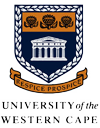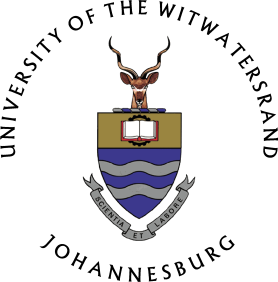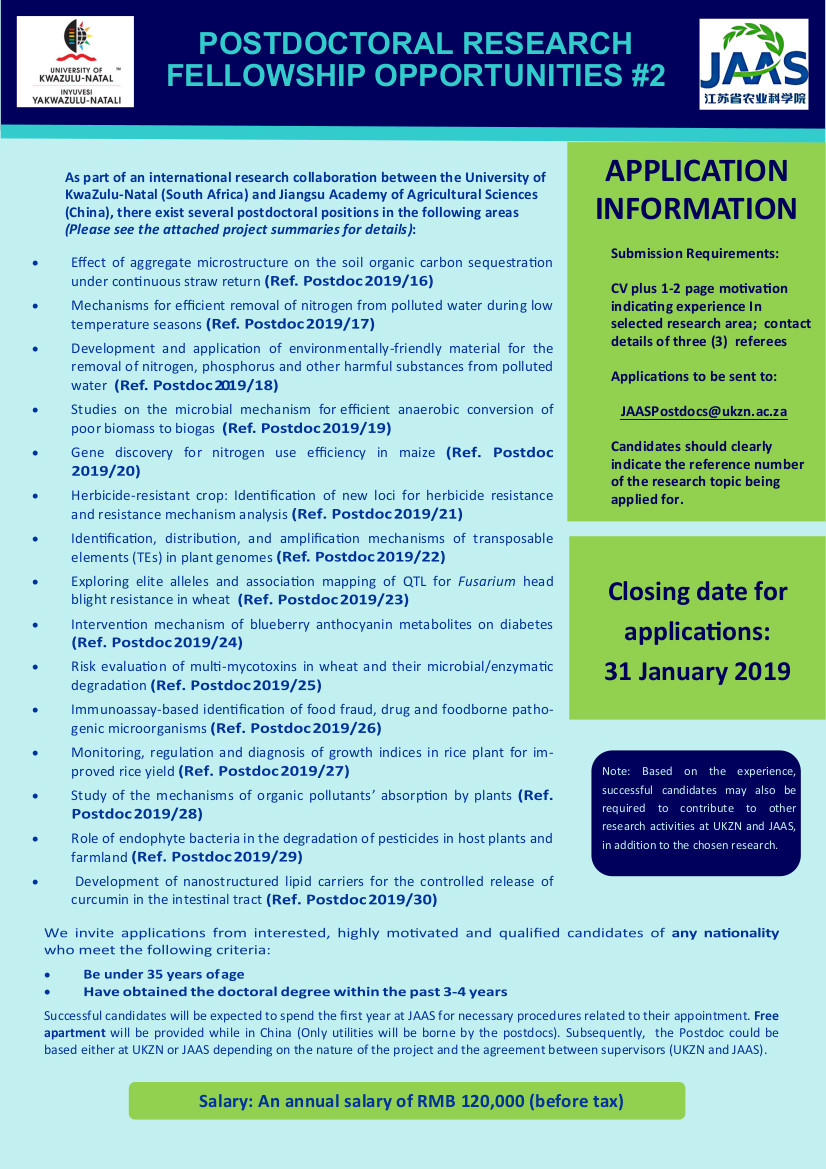Danie La Grange
Stellenbosch University - Post-doctoral research fellowship

Stellenbosch University PhD opportunity
We are looking for a capable and energetic PhD student to work on a multidisciplinary project on the microbiome of wheat under Conservation Agriculture. The project will involve high throughput amplicon sequencing and qPCR methods, among others. The project is funded by the NRF, and there is a bursary available, however, preference will be given to students who already have their own bursary. The ideal candidate should have completed a MSc degree in Microbiology, Genetics or Biochemistry or any related field with a strong background in molecular biology. Preference will also be given to South African citizens.
Durban University of Technology Post-doc and PhD studentships

UKZN/JAAS Joint Postdoctoral Research positions
Obituary: Barend (Ben) Wilhelm Strydom (1932 – 2018)

Barend Wilhelm (Ben) Strydom was born in Rietbron in the Karoo on 7 October 1932 and passed away on 24 August 2018. As a child, he attended seven different schools since his father, an NG Church minister, served rural communities in the Eastern and Western Cape. He matriculated from Hoërskool Punt, Mosselbaai in 1950, where he was head boy. He graduated from the University of Stellenbosch with a BSc Agriculture (Microbiology) degree in 1954, the second person to graduate in this specialist field at the University. He completed an MSc Agriculture (Microbiology)(cum laude) in 1958 at the University of Pretoria, and a PhD in Microbiology at the University of Wisconsin Madison, USA in 1963. He was employed by the Department of Agriculture from 1955 to 1989, holding leadership positions from 1966 at the Plant Protection Research Institute, where he became Assistant Director. On creation of the Agricultural Research Council (ARC), he moved to Rustenburg as Director of the Tobacco and Cotton Research Institute from 1989 until his retirement in 1994. He also served as an Honorary and Extra-ordinary Professor of the University of Pretoria.
Dr Ben Strydom was a highly respected scientist in his specialist field of biological nitrogen fixation, and thereby made a significant contribution to Agriculture in South Africa. His PhD at the University of Madison on the growth requirements of Rhizobacteria that nodulate alfalfa, clover and pea plants was advised by the renowned leaders in the field, Professor’s Owen Allen and Ira Baldwin. On his return to South Africa, he set up the Biological Nitrogen Fixation research unit at the Rietondale campus of the Plant Protection Research Institute, Department of Agriculture.
Dr Strydom has been credited with establishing the legume crop inoculant industry in South Africa. He promoted quality control standards for bacterial inoculants through the Department of Agriculture and set the example through his rigorous research on the taxonomy and host specificity of rhizobacteria. Biological nitrogen fixation enriches the soil and reduces the requirement for inorganic fertilizers for legume crop production such as soybean, french bean and lucerne. Soybeans alone are grown on approximately 750 000 ha in South Africa (GrainSA, 2017) with biological nitrogen fixation reducing the dependence on inorganic nitrogen fertilizer. Biological nitrogen fixation, therefore, makes an important contribution to the gross production value of soybean production estimated at R5 billion annually (DAFF, 2017).
Dr Strydom’s contribution to Agriculture in South Africa was recognised by several awards, namely the Havenga Agricultural Researcher of the Year in 1981 from the South African Academy for Science and Art, and the Agriculturalist of the Year Award in 1994 from the SA Agricultural Writers Association, including that same year’s award from the then Transvaal section. In 1980, Dr Strydom was awarded a commemorative medal together with other notable alumni from the University of the Pretoria.
He served the local Agricultural science community, often in leadership roles. He was President of the combined South African Society for Plant Pathology and Microbiology from 1973-1976, having been a member since 1964, and he was elected a Fellow in 1986. He was passionate about quality standards in scientific publication and the importance of scientific peer review. To this end, he was President of the Joint Council for Natural Science Societies for two years (1985-1986) and was liaison committee member for the molecular sciences as well as agricultural sciences from 1980-1982. He was on the Executive Committee (1987-1991) of the South African Council of Natural Scientists, now SACNASP (South African Council of Natural Scientific Professions), serving on the Board for a total of nine years.
Dr Strydom recognised the potential of biotechnology, leading workgroups on its implementation in the Department of Agriculture and the ARC (1984-1988). As a member of the SA Committee for Genetic Experimentation (SAGENE)(1987-1991), he contributed to the judicious introduction of genetically modified crops to South Africa, which was later formalized by the GMO Law. He served on advisory boards at the CSIR, the FRD (now the NRF), and the Laboratory of Molecular and Cell Biology at the University of Witwatersrand (1985-1987).
Dr Strydom published 83 peer-reviewed publications under the name BW Strijdom, including eight book chapters. He was invited speaker at international nitrogen fixation conferences in USA, Australia, Germany, Scotland, and Ethiopia. He served as Board Member of the Bacteriology Division of the International Committee for Microbiology for several years (1974-1981) and was a member of the American Society for Microbiology from 1974-1991. Significantly, as an alumnus of the University of Wisconsin, he was presented in 1974 with a unique award of a signed original copy of the 1932 classic monograph on nitrogen fixation by Fred, Baldwin, and McCoy.
In addition to his scientific contributions, Dr Strydom commanded great respect amongst his colleagues and co‑researchers due to his scientific insight, excellence and rare ability to establish the crux of a problem. He was a mentor for young scientists, and supervised and examined several PhD and MSc studies. His leadership, charisma, sense of humour, and open-heartedness made him a role model for many.
He leaves behind his wife Elsa, four daughters, and ten grandchildren.
Prepared by Prof Dave Berger, Prof Gerhard Pietersen & Dr Santie de Villiers
Post Graduate Research Opportunities - University of the Western Cape
 The Institute for Microbial Biotechnology and Metagenomics (IMBM) is a leading research unit based within the Department of Biotechnology at the University of the Western Cape (UWC). Our research employs culture-based approaches as well as cutting edge ”omics” strategies to study microbiomes and identify novel biosynthetic gene clusters and metabolites. The Institute focuses on the research and development of novel, high - value natural products for the pharmaceutical, cosmeceutical, food and beverage and agricultural industries, as well as products for industrial processes.
The Institute for Microbial Biotechnology and Metagenomics (IMBM) is a leading research unit based within the Department of Biotechnology at the University of the Western Cape (UWC). Our research employs culture-based approaches as well as cutting edge ”omics” strategies to study microbiomes and identify novel biosynthetic gene clusters and metabolites. The Institute focuses on the research and development of novel, high - value natural products for the pharmaceutical, cosmeceutical, food and beverage and agricultural industries, as well as products for industrial processes.
 |
MSc and PhD POSITIONS AVAILABLE 1. Expression and characterization of an endolysin from a novel Paenibacillus larvae phage, and its assessment as a phage therapy against AFB disease which affects the Western Cape honeybee, in collaboration with the ARC Infruitec-Nietvoorbij. 2. Genome sequence analysis of a marine isolates that produce potent activity against the ESKAPE pathogens, in collaboration with academic and industry partners. 3. Characterisation of anti-cancer activity produced by a marine isolate: a genomic and chemical approach, in collaboration with MEDINA (Spain). 4. The investigation of bacteriophages associated with Chryseobacterium and their potential in combating food spoilage. Novel enzymes and compounds produced by Chryseobacterium will also be investigated. Minimum requirements: BSc Hons, MSc, or an equivalent qualification, with a minimum average score of 60% and a major in either Microbiology, Biotechnology, Biochemistry or Genetics. Only South African citizens can be considered. Additional requirements: Experience and skill in molecular biology techniques; responsibility, reliability, good problem solving, time management, communication (written and verbal) and interpersonal skills, as well as computer literacy are absolute requirements. |
|
Application Submission: Applicants are to submit their CV and covering letter to Prof Marla Trindade: This email address is being protected from spambots. You need JavaScript enabled to view it.. THE CLOSING DATE FOR APPLICATIONS IS 9 January 2019. |
 |
Post Graduate Research Opportunities - University of the Western Cape
 The Institute for Microbial Biotechnology and Metagenomics (IMBM) is a leading research unit based within the Department of Biotechnology at the University of the Western Cape (UWC). Our research employs culture-based approaches as well as cutting edge ”omics” strategies to study microbiomes and identify novel biosynthetic gene clusters and metabolites. The Institute focuses on the research and development of novel, high - value natural products for the pharmaceutical, cosmeceutical, food and beverage and agricultural industries, as well as products for industrial processes.
The Institute for Microbial Biotechnology and Metagenomics (IMBM) is a leading research unit based within the Department of Biotechnology at the University of the Western Cape (UWC). Our research employs culture-based approaches as well as cutting edge ”omics” strategies to study microbiomes and identify novel biosynthetic gene clusters and metabolites. The Institute focuses on the research and development of novel, high - value natural products for the pharmaceutical, cosmeceutical, food and beverage and agricultural industries, as well as products for industrial processes.
 |
TWO POSTDOCTORAL FELLOWSHIPS AVAILABLE: 2. We are developing a portfolio of biosurfactants for use in a variety of industrial processes. The project involves the isolation and characterisation (chemical, structural and performance) of novel biosurfactants, as well as the upscaling of biosurfactant production. Minimum Criteria: Applicants must have completed a PhD degree within no more than 5 years in a foundational discipline relevant to the topic. Experience in natural product discovery and genomics is an advantage. Applicants should have a strong publication record, interpersonal skills, project management experience, and be able to effectively conduct research as part of a multi-disciplinary team.
|
|
Application Submission: The candidate will be under the supervision of Prof. Marla Trindade who holds a DST/NRF Research Chair in Microbial Genomics. Applicants are to submit their CV and covering letter to This email address is being protected from spambots. You need JavaScript enabled to view it.. THE CLOSING DATE FOR APPLICATIONS IS 9 January 2019. |
 |
Post-Doctoral Fellows - Plant Biotechnology WITS

Professor Chrissie Rey
Functional Metagenomics 2019
16-19 June 2019, Trondheim, Norway
Registration opens: 1 January 2019
Early bird registration ends: 28 February 2019
Biosurfactants 2019

Registration fee
€ 450,00 Academic Participants; € 350,00 in case of registration before March 31th, 2019
€ 590,00 Industrial Participants; € 490,00 in case of registration before March 31th, 2019
Registration is now open, please use the following link:
Register for Biosurfactants | 2019
During the process you will be asked to create an account. With this account you can login later to check your documents (invoice & ticket), submit or modify an abstract or change your personal data.
If you have any questions, please contact the conference office.



